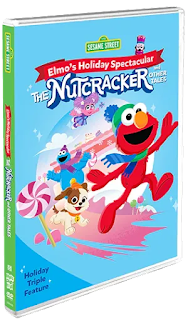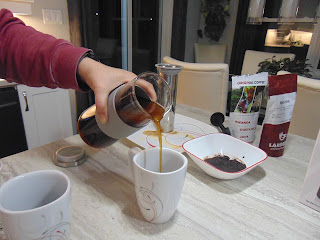A while back I received the Cold Brew Pitcher and coffee samples. Being sick and not feeling up to myself I finally am able to get this posted for you all. Its really a great pitcher and can be used either cold or hot. The coffee samples I received are Kenya Washed on the left and Tipica Honey next to the pitcher.
Now about the pitcher, it is a stunning borosilicate glass carafe with high-precision stainless steel infuser. Cold brew up to 44oz of coffee effortlessly by placing in the refrigerator overnight. Need iced coffee quicker? Brew with hot water and add ice. The heat resistant glass body can go from boiling to freezing in minutes. Cleanup is a snap, as all items are dishwasher safe.
Made in China | 44oz | 1.3L | 10.25" tall | 4" diameter
So now in the following photos we will show step by step on how to use the pitcher and coffee. So take the inside out and add your coffee to it. Then put it back into the pitcher and add your water.
Now you can add ice cubes so you don't have to wait for it to cool down and put it in the fridge to get cold.
Once it has settled and your coffee is in the pitcher and the ice cubes have melted this is what it will look like.
Now you are ready to help yourself to a great cup of iced coffee.
Mmmm my friend says its absolutely delicious.
There are 12 different kinds of coffee you can get to try.
Let's see there is Catuai Anaerobic. This fruit bomb with lush notes of cherry, black currant, passion fruit, and cocoa comes from Hacienda San Isidro Labrador Project, a farm is located 1900 meters above sea level on the hills of Dota, in the Tarrazu region. It is a small, family-owned farm overseen by Johel Monge Naranjo and his son Matias. The pair focus on specialty and traceable coffee. Their product have consistently placed atop the annual Cup of Excellence competition that identifies the very best coffee being grown in Costa Rica.
Kenya Washed which is what I received. This layered coffee with notes of citrus accented by sweet sugar cane, and milk chocolate comes from Cafetalera Herbazu, a farm and micro mill located in Cirrí de Naranjo, one of the three narrow geographical areas that in recent years have produced the best lots of high-quality Costa Rica coffee. This farm had belonged to many generations of Antonio Barrantes Zuniga's family and he continues to personally oversee all aspects of cultivation, harvesting and production of his award-winning coffees, which frequently feature among the finalists of the annual Cup of Excellence competition.
Monobamba Washed Monobamba
is a mountainous region where the Amazon jungle meets the Andes. Its
altitude and climate are ideal for cultivating great coffee. These
Arabica beans were processed in the traditional washed process. The
coffee is clean, bright, vibrant, and complex, with notes of tangerine, concord grape, and black currant. A well-balanced cup with velvety body and flavors that layer as the coffee cools.
Junin Anaerobic Anaerobic process involves fermenting depulped cherries devoid of oxygen in water-filled vessels. It produces fruit forward coffee, abundant in complexity and low in acidity. This lot is an atomic bomb of tropical fruit and caramel sweetness with a syrupy smooth body. The cup is infinitely complex and as it cools the layers of flavors radiate and linger. This is an excellent example of Peru's potential for amazing quality and tremendous value.
Catuai Honey This complex blend of juicy clementines, tart cranberries, and ripe pomegranate hails
from Don Mayo micro mill, among the oldest in Tarrazu region of Costa
Rica, owned by Hector Bonilla and family. The Bonillas oversee the
entire process from the harvesting of cherries to the milling of green
coffee. The in between steps involve an efficient and water conserving
mechanical washing of cherries and the drying of parchment on raised
beds. This particular lot comes from the farm which won the Presidential
Award at the first place of Cup of Excellence Costa Rica 2009.
Tipica Honey This solid, well balanced cup with lingering notes of citrus, red apple, and pear comes from Cafetalera Herbazu, a farm and micro mill located in Cirrí de Naranjo, one of the three narrow geographical areas that in recent years have produced the best lots of high-quality Costa Rica coffee. This farm had belonged to many generations of Antonio Barrantes Zuniga's family and he continues to personally oversee all aspects of cultivation, harvesting and production of his award-winning coffees, which frequently feature among the finalists of the annual Cup of Excellence competition.
Geisha Caturra Washed Heirloom variety Gesha with Caturra processed in the traditional wet (washed) fermentation method. The cup is notably bright with notes of citrus, red apples, and grapes. The flavors are complex and well balanced, making this a very pleasant coffee experience. Peru's climate, altitude, and soil conditions are ideal for cultivating great coffee. This is a good example of the country's potential for amazing quality and tremendous value.
Junin Natural This is a naturally processed coffee, whereby the cherries are allowed to dry and ferment in their "natural" state. The result is a geyser of lush tropical flavors: mango, passionfruit, and papaya. The cup is juicy, vibrant, but not overly acidic. Body is medium, allowing the natural flavors to shine. Peru's climate, altitude, and soil conditions are ideal for cultivating great coffee. This is a good example of the country's potential for amazing quality and tremendous value.
Castillo Washed This vibrant and balanced cup with lingering notes of cantaloupe, clementine, and red grapes comes from the Campo Alegre farm, located in the Antioquia region of Colombia, the birthplace of the country's coffee industry. These Arabica beans were processed in the traditional washed process. The coffee is juicy and complex, reflecting Martin's dedication to tree maintenance, harvest timing, and cherry sorting. The recently improved wet mill and marquesinas underscore Martin's attention to detail and how it translates to a great cup of coffee.
Geisha Washed This Geisha micro lot comes from Finca Abarim, nestled high in the Colombian Andes, where volcanic soil and a unique microclimate make it an ideal location for the cultivation of this prized variety. These Geisha beans had undergone a mix of both aerobic and anaerobic processes to achieve their superb taste. To tease out natural sugars, red coffee cherries were first stored in anaerobic condition (no oxygen) for 126 hours. Their red skins were then removed and the beans fermented in the open air for 36 hours. The process was completed with the beans washed in clean basins.
Geisha Honey This Geisha micro lot comes from Finca Abarim, nestled high in the Colombian Andes, where volcanic soil and a unique microclimate make it an ideal location for the cultivation of this prized variety. These Geisha beans had undergone a mix of both aerobic and anaerobic processes to achieve their superb taste. To tease out natural sugars, red coffee cherries were first stored in anaerobic condition (no oxygen) for 126 hours. Their red skins were then removed and the beans (with mucilage intact) fermented in the open air for 52 hours.
Catuai Natural This complex blend of juicy clementines, tart cranberries, and ripe pomegranate hails from Don Mayo micro mill, among the oldest in Tarrazu region of Costa Rica, owned by Hector Bonilla and family. The Bonillas oversee the entire process from the harvesting of cherries to the milling of green coffee. The in between steps involve an efficient and water conserving mechanical washing of cherries and the drying of parchment on raised beds. This particular lot comes from the farm which won the Presidential Award at the first place of Cup of Excellence Costa Rica 2009.
You can see all of these coffees here https://lardera.com/coffee.html
To read about the cold brew pitcher and read reviews on this check it out here https://lardera.com/cold-brew-pitcher.html
So three lucky winners
will get themselves a Cold Brew Pitcher and some coffee samples to
try. So get your entries in today and good luck to everyone. Open to US and Canada. Ends Oct. 11/2022
Due to a glitch in the giveaway tools I have to mark the winners here.
they are Micheline Boyle, Janette van der Leeuw AND Amy Cleaveley
Congratulations to the winners.













